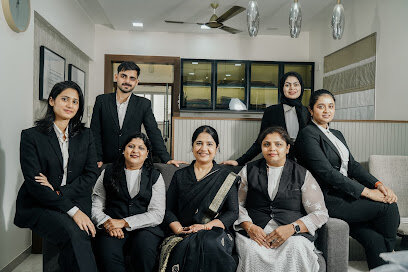Best Divorce & Separation Lawyers in Pune
Share your needs with us, get contacted by law firms.
Free. Takes 2 min.
Free Guide to Hiring a Family Lawyer
List of the best lawyers in Pune, India
India Divorce & Separation Legal Questions answered by Lawyers
Browse our 2 legal questions about Divorce & Separation in India and read the lawyer answers, or ask your own questions for free.
- Married life issue.
- How to get divorce. What is the criteria.
-
Lawyer answer by MAH&CO.
Thank you for your question.As an experienced family lawyer with decades of practice in divorce, khula, and marital dispute resolution, I can guide you through the legal process of obtaining a divorce in Pakistan. Divorce Procedure & Criteria (for Men):Under...
Read full answer - It is possible to do a marriage null and void?
- I’m French and live in France. I married with an Indian in Hathras in India. He lives in Delhi in Tagore garden. He cheated with me and he was interested by visa and money. He created a fake wedding card, made me sign some documents to get the registered marriage... Read more →
-
Lawyer answer by LAW CHAMBER OF ADVOCATE RAJVEER SINGH
BASED ON THE INFORMATION PROVIDED BY YOU, THIS MARRIAGE IS VOID AB INITIO AND IT CAN BE DECLARED VOID BY THE INDIAN FAMILY COURTAs you mentioned, since the marriage was conducted under the Hindu Marriage Act without a valid religious...
Read full answer
India Divorce & Separation Legal Articles
Browse our 1 legal article about Divorce & Separation in India written by expert lawyers.
- A Layman’s Guide to a Landmark Ruling on Rights of Divorced Muslim Women
- The Supreme Court of India, on 2 December 2025, delivered a judgment that carries deep significance for Muslim women across the country. The case, Rousanara Begum v. S.K. Salahuddin (2025 INSC 1375) SC Judgment of 2Dec2025, concerned a simple yet socially important question:When gifts such as cash, gold, or household... Read more →
About Divorce & Separation Law in Pune, India
Divorce and separation are legal processes by which a married couple can formally end their marital relationship. In Pune, as in the rest of India, these procedures are governed by various personal laws depending on the religion of the parties involved. Understanding the legal framework and seeking appropriate legal advice is crucial to navigating these often complex situations.
Why You May Need a Lawyer
There are several situations in which individuals may require legal assistance in matters of divorce and separation:
- Filing for divorce: Understanding the correct procedure, grounds for divorce, and paperwork needed.
- Legal representation: Having a professional to represent you in court can ensure your rights and interests are protected.
- Child custody and visitation: Legal advice can help in negotiating fair custody arrangements and visitation rights.
- Division of assets: Ensuring equitable distribution of marital property and assets requires legal expertise.
- Maintenance and alimony: Legal help can guide you on eligibility for spousal support and how much you can claim or may need to pay.
Local Laws Overview
In Pune, several local laws and personal laws govern divorce and separation, which include:
- Hindu Marriage Act, 1955: Governs divorce and separation for Hindus, including Sikhs, Jains, and Buddhists.
- Special Marriage Act, 1954: Applicable to couples of different religions or those who registered their marriage under this Act.
- Indian Divorce Act, 1869: Pertains to Christians seeking divorce.
- Muslim Personal Law (Shariat) Application Act, 1937: Covers divorce among Muslims (via Talaq, Khula, etc.).
- Parsi Marriage and Divorce Act, 1936: Governs Parsis (Zoroastrians).
Additionally, the Family Courts Act, 1984, is significant as it established Family Courts to resolve family disputes more efficiently.
Frequently Asked Questions
1. What are the grounds for divorce in Pune, India?
The grounds for divorce vary based on the personal laws applicable to the couple but can include adultery, cruelty, desertion, conversion to another religion, mental disorder, communicable disease, and mutual consent.
2. How long does it take to get a divorce in Pune?
The duration can vary widely. Mutual consent divorces can be completed in 6-18 months, while contested divorces can take several years.
3. Can I get a divorce based on mutual consent?
Yes, mutual consent divorce is available under various personal laws and is generally faster and less contentious.
4. How is child custody decided?
Courts prioritize the welfare of the child. Factors include the child's age, parents' financial stability, and the child's preference (if of age to express a rational choice).
5. What is alimony, and how is it determined?
Alimony is financial support given to a spouse post-divorce. It is determined based on factors such as the duration of marriage, income and expenses, age, health, and standard of living.
6. Is mediation required before filing for divorce?
Mediation is not mandatory but is encouraged to resolve issues amicably. Family courts often advise couples to seek mediation before proceeding with litigation.
7. Can I file for divorce without a lawyer?
Technically yes, but it is not advisable due to the complexity of laws and procedures involved. A lawyer can ensure that all legal formalities are properly followed.
8. What documents are needed to file for divorce?
Common documents include a marriage certificate, proof of address and identity, photographs, evidence supporting grounds for divorce, and financial statements.
9. How is property divided in a divorce?
Property division depends on mutual agreement or court orders. Courts consider contributions to property purchase, financial status, and future needs of both parties while dividing the assets.
10. What should I do if my spouse refuses to agree to a divorce?
If your spouse refuses, you can file a contested divorce on valid grounds as per applicable personal laws. Legal representation is crucial in contested divorces.
Additional Resources
For further assistance, consider consulting the following resources:
- Family Courts in Pune
- Pune District Legal Services Authority
- National Commission for Women
- NGOs like Majlis and Swayam offering legal aid and counseling
Next Steps
If you need legal assistance in matters of divorce and separation, follow these steps:
- Consult with a qualified family lawyer to understand your rights and options.
- Gather all necessary documents and evidence related to your case.
- Consider mediation to resolve disputes amicably.
- If necessary, file the appropriate petition in the local Family Court.
- Stay informed and keep open communication with your legal representative.
Taking informed steps and seeking professional legal advice are crucial to navigating divorce and separation successfully.
Lawzana helps you find the best lawyers and law firms in Pune through a curated and pre-screened list of qualified legal professionals. Our platform offers rankings and detailed profiles of attorneys and law firms, allowing you to compare based on practice areas, including Divorce & Separation, experience, and client feedback.
Each profile includes a description of the firm's areas of practice, client reviews, team members and partners, year of establishment, spoken languages, office locations, contact information, social media presence, and any published articles or resources. Most firms on our platform speak English and are experienced in both local and international legal matters.
Get a quote from top-rated law firms in Pune, India — quickly, securely, and without unnecessary hassle.
Disclaimer:
The information provided on this page is for general informational purposes only and does not constitute legal advice. While we strive to ensure the accuracy and relevance of the content, legal information may change over time, and interpretations of the law can vary. You should always consult with a qualified legal professional for advice specific to your situation.
We disclaim all liability for actions taken or not taken based on the content of this page. If you believe any information is incorrect or outdated, please contact us, and we will review and update it where appropriate.
















